
*
Cate Blanchett is an enigmatic chameleon adept at crossing borders, adapting to the called-for international milieu and making herself right at home all over the globe.
All angular and incisive, she wafted through the life of Howard Hughes as the young Katharine Hepburn and, astonishingly, won an Academy Award for it. In 2006 — when Helen Mirren had all the award bases, from small screen to big, covered as Queen Elizabeth I and II — Blanchett still gave her a run for the Oscar gold and became the only actress ever to win a second Oscar nomination for playing the Tudor queen. She reigned over J.R.R. Tolkien's Middle-earth for the entire "Lord of the Rings" trilogy as the elf queen with the cascading yellow curls, Galadriel — and she's coming back for seconds via its two-part prequel, "The Hobbit," due out this December and next.
She was Irina Spalko to Harrison Ford's Indiana Jones, Marian to Russell Crowe's Robin Hood and one of six Bob Dylans (the Oscar-nominated one) in "I'm Not There."
Simply put, she is an artist without boundaries — geographical or, as it turns out, gender — someone who can play anyone anytime anywhere. This gift comes from a fiercely focused talent and, just perhaps, an eclectic gene pool. It may surprise you to know that, in addition to being half-Australian, she is half-Texan. Yep, Robert DeWitt Blanchett, Jr., her dad, was a U.S. Navy officer whose ship dropped anchor in the late '60s in Melbourne where his bride-to-be, June Gamble, was a property developer. They evidently, in the words of one of Hepburn's latter-day queens, "shattered the commandments on the spot," and provided Blanchett with a vivid and colorfully varied pedigree.
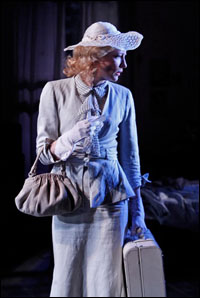 |
||
| Blanchett in A Streetcar Named Desire. |
||
| photo by Richard Termine |
That trend will likely continue, at least in movies, for a spell. Woody Allen and Terrence Malick, who are poles apart as directors, snapped her up for their most recent "untitled projects" (Allen's is set in Manhattan, Malick's in Austin).
And Barbra Streisand is paging her for her next directorial effort, a bio film called "Skinny and Cat." It will examine the improbable, if not impossible, marriage (1939-1942) of Margaret Bourke-White, Life magazine's legendary Bronx-born photographer, and the Georgia cracker who wrote God's Little Acre and Tobacco Road, Erskine Caldwell (Colin Firth, sans his halting King's English, presumably).
These flick trips have been fast and furious for her ever since "Oscar and Lucinda" (1997). The two things that keep her anchored are centrally located Down Under: family and theatre. She and her husband, playwright Andrew Upton, are parents of three sons (and went to some trouble naming them: Ignatius Martin Upton, 4; Roman Robert Upton, 7; and Dashiell John Upton, 9). They're also, since 2009, artistic heads of the Sydney Theatre Company, but they are surrendering that co-title before 2013.
"You never really give it up, of course," she sighed helplessly. "I'll continue to act for the company. In fact, we just set our final season, and I'm going to be in one of the plays. I've been working with these actors so long there they're all like family now."
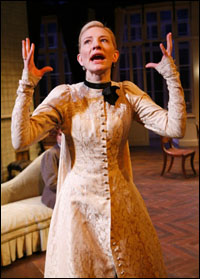 |
||
| Blanchett in Hedda Gabler. |
||
| Photo by Richard Termine |
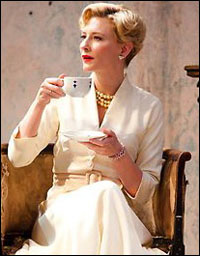 |
||
| Blanchett in Uncle Vanya. |
||
| photo by Lisa Tomasetti |
The Sydney Theatre Company is a theatre-based launching pad that has sent more than Blanchett into the cinematic stratosphere. Weaving, who was Elrond to her Galadriel in the "Hobbit"/"Rings" cycles and Judge Brack to her Hedda Gabler, hit Hollywood pay-dirt with "Captain America" and the "Matrix" movies. Vanya's ancient nanny, Jacki Weaver, stepped out of nowhere into the Oscar running a few years back for her scene-stealing support in "Animal Kingdom." When Blanchett first hit her award-courting stride in the early '90s, it was on the stage in Sydney opposite Geoffrey Rush in Oleanna and as Ophelia to Richard Roxburgh's Hamlet.
"It was, really, a great Hamlet, and Richard has a solid theatre rep in Australia," she said of the actor known internationally for his Duke of Monroth in Baz Luhrmann's "Moulin Rouge." "In fact, our Vanya grew out of the idea of him playing the title role."
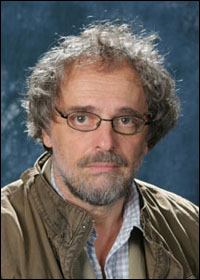 |
||
| Tamás Ascher |
Essentially, what we have here is the UN edition of Anton Chekhov's human comedy, a Russian classic translated into Aussie-accented English and helmed by a Hungarian. Alongside all that, Blanchett's Texas bloodline pales considerably.
Upton, who tailored the company's most recent Hedda Gabler to his wife's specifications, huddled with Ascher over revising Vanya. The director opted for a roughhouse, almost slapstick attack on the characters rather than the usual mopey simpatico. Also, the action of the play was moved forward 50 or so years, from a country estate at the turn of the 20th century to rural Russia in the 1950s.
Given her self-professed love of New York audiences and how she has been tippy-toeing around town with one movable feast after another that deserves much longer engagements, can she at 43 see herself making a late-blooming Broadway debut?
"I suppose I'll be on Broadway one of these days — it's something I really want — but I can't say when or where and even what that will be because of this regimented life I lead, trying to make a place for family and maintain a film career and still be relatively faithful to my first love, the theatre. It's a very tight tug-of-war."
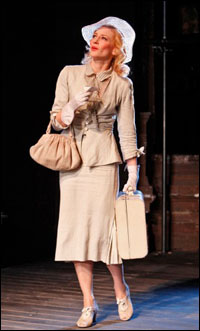 |
||
| Blanchett in A Streetcar Named Desire. |
||
| photo by Richard Termine |
Again, the Uptons hired a director who was light years removed from Australia but dead-on right for the task: Liv Ullmann, the Ingmar Bergman actress and late-blooming director. "Liv," said the actress who went through the motions, "had never played Blanche DuBois before, but I like to think that she did with this production."
If you feel you've taken Streetcar more times than the subway, it's likely you've memorized the blocking as much as the words. Ullmann kicked down some longstanding traces and rearranged the actors on stage as she might roses in a vase. Her most powerful and poignant innovation was Blanche's exit. Instead of leaving with a measure of dignity on the arm of her hoped-for "kind stranger," she strikes out alone, wildly confused, moving offstage into a cruelly glaring spotlight that might be her growing madness.
A stunning fade-to-white! And Blanchett played it with heart-breaking aplomb. It makes you think Brantley might be right: she is among our best and bravest.









